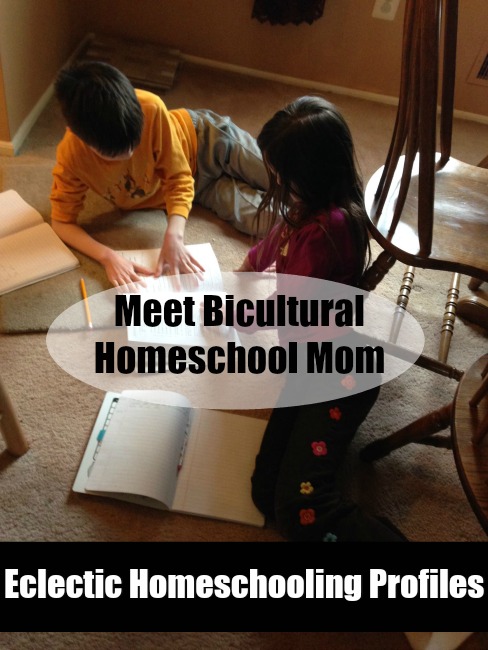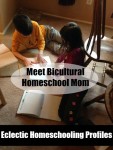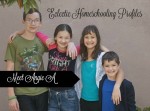
Eclectic homeschooling involves meshing different educational philosophies and methods into something that works for your family. As a result this will look different from family to family. We are featuring a series of interviews with eclectic homeschoolers to show how varied eclectic homeschooling can be.
Meet Bicultural Homeschool Mom! Check out her blog at http://biculturalhomeschool.blogspot.com/
Why did you decide to homeschool?
So many reasons! My kids started out in public school, and the school’s one-size-fits-all philosophy was not working. My daughter was bored in K, and 1st, because she learned to read before K. My son’s development was asynchronous-he was ready for more challenge in math and science and would space out and get in trouble in class, yet he was a late reader and speller and needed extra help there. They also had some trouble socially in school. Kids are mean! I also didn’t like the influence that other kids were having on my kids, and as they got older, I knew this would become more and more of an issue. I also wanted them to learn from a Christian worldview. God is absent in public school, yet we believe He should be at the center of our lives and I wanted them to see that learning is not disconnected from spirituality. Finally, I wanted more time together. After 7.5 hours at school, hours with homework, plus extra-curriculars, we had very little time for the things I felt were important to us: family time, child-led learning, spiritual guidance, and practical skills.
How long have you been homeschooling?
2 years
What ages/grades are you homeschooling?
I have an 11 year old (6th grade) son and a 9 year old (4th grade) daughter.
What were your results on the What Kind of Homeschooler Are You Quiz?
Score for Waldorf Education: 8
Score for Traditional Education: -23
Score for Unit Studies Education: 19
Score for Montessori Education: 21
Score for Thomas Jefferson Education: 9
Score for Unschooling: 16
Score for Classical Education: 18
Score for Charlotte Mason Education: 21
Use 3 words to describe your homeschool:
Piecemeal, varied, work-in-progress
What makes your homeschool eclectic?
I use a variety of methods and philosophies because I think there are benefits to many different approaches. I love Charlotte Mason’s living books philosophy, but I also love to add videos to our learning. I make time for child-led learning, but I know my kids are not motivated enough to completely leave it up to them, so I do choose some topics because they “just have to know it”. I also like to include Latin/Greek roots and logic, although we don’t focus on it. Every few months, we switch it up and do a unit study, because I love how it ties in many subjects into a single topic. I think I get bored easily and so do the kids, so we break things up by doing a little bit of this, a little bit of that, rather than using a full curriculum the whole year.
Have you always been an eclectic homeschooler?
When I first started researching homeschooling, I read up on all the various philosophies, trying to find which one I agreed with most, and found that I agreed with a lot of them to some degree and I couldn’t choose! At first, I got an all-in-one curriculum, which used living books, had a unit study feel and laid it all out in a schedule. I don’t regret using it, because it helped me get my feet wet, but what I quickly found was that I did not like to go by their schedule and suggestions. Once I felt more comfortable with making my own plans, I started piecing together my own lessons from various resources and making our schedule more flexible.
What do you think makes your homeschool unique?
I think every homeschool is unique! But then, the more I meet more homeschoolers, the more I find in common with them! But if I had to say what’s different about us, two things come to mind:
1) I’m a working mom, who works 30 hours a week in a software development job (mostly from home). This means we often have to homeschool at different hours than others and we break up the learning throughout the day. The hands-on teaching from me is short, and we don’t have as much freedom to participate in homeschool activities and co-ops that meet during the day. It does limit us, but we are making it work.
2) We are a bicultural family-my family is Chinese, my husband’s is Irish. At first, I didn’t know any Asians who homeschooled, but recently I’ve met many! I like that I can incorporate Chinese lessons as ‘part of school’ by using it in every day life. I think coming from 2 different cultures gives the kids a different perspective-not every family will look the same, and even within our own extended family, my family has certain customs and my husband’s family has different customs.
What does a typical day or week look like in your homeschool?
We start with our Morning Meeting, which includes our “together work”-Bible, science/social studies, vocab review. Then they do individual/independent work (reading, language arts, math. any assignments for science/history/geography that they can do independently) and I help them as needed, while I do work for my job. During lunch, we do a Lunch Lesson: I do a very brief Chinese lesson and sometimes do a read-aloud while they eat. Then they continue any unfinished work after lunch and work on what I call “Free Exploration”, which is our child-led learning time (we get library books, they can work on their own creative projects, they can pull out science kits, etc.). After mid-afternoon, I stop working for my job and we do any hands-on activities or discussions planned that reinforce the days’ lessons or spend time outdoors or with friends. This is also when I try to do ‘practical training’-cooking, laundry, etc. Of course, this is what I *plan* to do, but probably more typically, there’s a lot of distractions and delays, a few tantrums, and things we skip because we didn’t have time to squeeze it in while also juggling my job! We try to take Fridays off.
What curriculum has worked in your homeschool?
We are still trying to figure that out! I’m a curriculum-junkie- I love to read about and try out new material! We haven’t found anything we LOVE so much that I’m ready to stop looking! lol! It’s only been 2 years, after all. But if I had to choose some ‘staples’ that we have used and plan to continue to use: Singapore Math and Truthquest History. We are enjoying Ellen McHenry’s “The Elements” right now for chemistry and I like to throw in KONOS unit studies every few months, or included within our other science or social studies topics.
Do you have any favorite homeschooling books?
I really liked Cathy Duffy’s 102 Top Picks for Homeschool Curriculum, and Debra Bell’s The Ultimate Guide to Homeschooling, and Cindy Gaddis’ The Right Side of Normal (This is a great resource for right-brained kids. It really helped me understand and not get angry with the differences I saw in how my son processes information.)
Do you tweak curriculum to work for you? Describe how you do that.
Yes. I often skip questions/assignments that I don’t feel would add any value. I also add material to go more in depth pretty often. I supplement with videos when I can, and pull from many different resources (internet, other curricula, etc).
Anything else you would like to share:
I love the freedom to pick and choose what we do! I know I have a different philosophy than many homeschool moms I meet, and I don’t think my way is better or more right than theirs or that theirs is better or more right than mine. When people ask me ‘How do you homeschool?’ or ‘What do you use?’ I always couch my answers with “Everyone is different, you have to find what works for your family.” Don’t be afraid to try out different things, you never know what will work or not work for your child.






